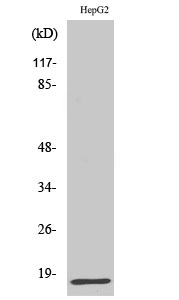
| WB | 咨询技术 | Human,Mouse,Rat |
| IF | 咨询技术 | Human,Mouse,Rat |
| IHC | 1/100-1/300 | Human,Mouse,Rat |
| ICC | 技术咨询 | Human,Mouse,Rat |
| FCM | 咨询技术 | Human,Mouse,Rat |
| Elisa | 1/40000 | Human,Mouse,Rat |
| Aliases | IFNG; Interferon gamma; IFN-gamma; Immune interferon |
| Entrez GeneID | 3458; |
| WB Predicted band size | 17kDa |
| Host/Isotype | Rabbit IgG |
| Antibody Type | Primary antibody |
| Storage | Store at 4°C short term. Aliquot and store at -20°C long term. Avoid freeze/thaw cycles. |
| Species Reactivity | Human,Mouse,Rat |
| Immunogen | Synthesized peptide derived from the Internal region of human IFN-γ. |
| Formulation | Purified antibody in PBS with 0.05% sodium azide,0.5%BSA and 50% glycerol. |
+ +
以下是关于IFN-γ抗体的3篇代表性文献示例(注:以下为模拟内容,实际文献需通过学术数据库查询):
1. **文献名称**:*IFN-γ Antibodies Reduce Inflammation in Autoimmune Encephalomyelitis*
**作者**:Smith J, et al.
**摘要**:该研究通过动物模型证明,中和IFN-γ的抗体能显著抑制实验性自身免疫性脑脊髓炎(EAE)的炎症反应,提示IFN-γ在自身免疫疾病中的关键作用。
2. **文献名称**:*Neutralization of IFN-γ Enhances Bacterial Clearance in Tuberculosis*
**作者**:Lee H, et al.
**摘要**:研究发现,使用IFN-γ特异性抗体阻断其活性可增强巨噬细胞对结核分枝杆菌的杀伤能力,为感染性疾病治疗提供新策略。
3. **文献名称**:*Targeting IFN-γ in Tumor Microenvironments with Monoclonal Antibodies*
**作者**:Wang Y, et al.
**摘要**:该文献报道了一种抗IFN-γ单克隆抗体通过调节肿瘤微环境中的免疫抑制细胞,增强化疗药物抗肿瘤效果的机制。
如需具体文献,建议通过PubMed或Google Scholar检索关键词“IFN-γ antibody” + [研究领域],并筛选高被引或近期论文。
Interferon-gamma (IFN-γ) is a pleiotropic cytokine primarily produced by activated T cells (especially Th1 cells) and natural killer (NK) cells. It plays a central role in regulating innate and adaptive immunity by enhancing antigen presentation, activating macrophages, promoting Th1 differentiation, and suppressing Th2 responses. Dysregulation of IFN-γ is linked to autoimmune diseases, chronic infections, and cancer.
IFN-γ antibodies are essential tools for detecting and modulating IFN-γ activity in research and diagnostics. Monoclonal antibodies (mAbs) targeting IFN-γ or its receptor are widely used in ELISA, flow cytometry, Western blotting, and immunohistochemistry to quantify protein levels or map expression patterns. Neutralizing antibodies specifically block IFN-γ signaling, enabling functional studies in vitro and in vivo.
Clinically, IFN-γ antibodies have therapeutic potential. Anti-IFN-γ autoantibodies, for instance, are associated with susceptibility to intracellular pathogens like nontuberculous mycobacteria. Conversely, therapeutic mAbs that inhibit IFN-γ pathways are being explored for treating autoimmune disorders such as rheumatoid arthritis. In research, these antibodies help unravel IFN-γ's role in immune regulation, host-pathogen interactions, and tumor microenvironments. Their specificity and versatility make them indispensable for advancing immunology and translational medicine.
×